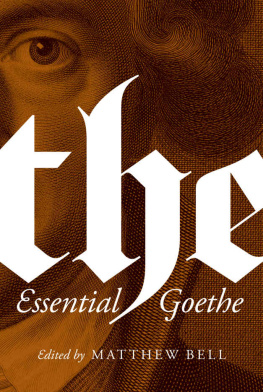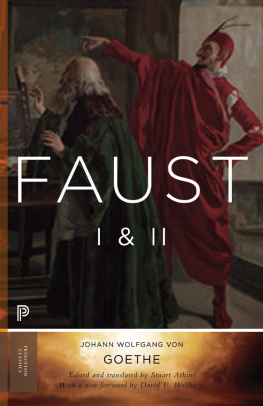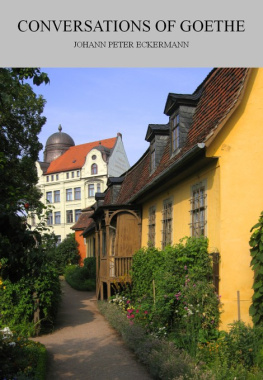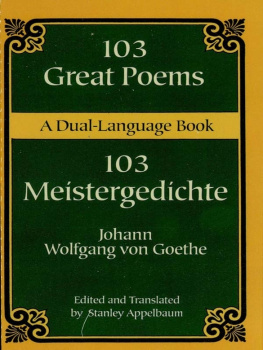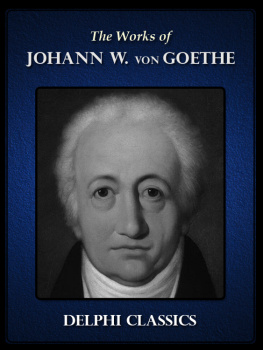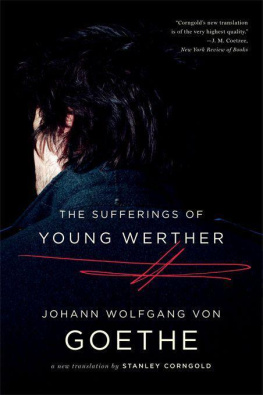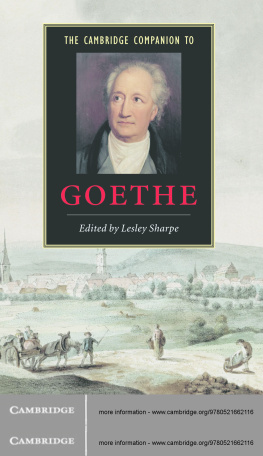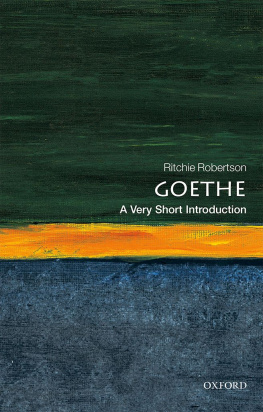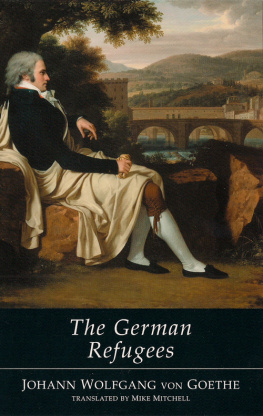Johann Wolfgang von Goethe - The Essential Goethe
Here you can read online Johann Wolfgang von Goethe - The Essential Goethe full text of the book (entire story) in english for free. Download pdf and epub, get meaning, cover and reviews about this ebook. year: 2016, publisher: Princeton University Press, genre: Detective and thriller. Description of the work, (preface) as well as reviews are available. Best literature library LitArk.com created for fans of good reading and offers a wide selection of genres:
Romance novel
Science fiction
Adventure
Detective
Science
History
Home and family
Prose
Art
Politics
Computer
Non-fiction
Religion
Business
Children
Humor
Choose a favorite category and find really read worthwhile books. Enjoy immersion in the world of imagination, feel the emotions of the characters or learn something new for yourself, make an fascinating discovery.
- Book:The Essential Goethe
- Author:
- Publisher:Princeton University Press
- Genre:
- Year:2016
- Rating:4 / 5
- Favourites:Add to favourites
- Your mark:
- 80
- 1
- 2
- 3
- 4
- 5
The Essential Goethe: summary, description and annotation
We offer to read an annotation, description, summary or preface (depends on what the author of the book "The Essential Goethe" wrote himself). If you haven't found the necessary information about the book — write in the comments, we will try to find it.
Johann Wolfgang von Goethe: author's other books
Who wrote The Essential Goethe? Find out the surname, the name of the author of the book and a list of all author's works by series.
The Essential Goethe — read online for free the complete book (whole text) full work
Below is the text of the book, divided by pages. System saving the place of the last page read, allows you to conveniently read the book "The Essential Goethe" online for free, without having to search again every time where you left off. Put a bookmark, and you can go to the page where you finished reading at any time.
Font size:
Interval:
Bookmark:
The Essential Goethe

1791 engraving of Johann Wolfgang von Goethe, by Johann Heinrich Lips.
The Essential
Goethe
JOHANN WOLFGANG VON GOETHE
Edited and Introduced by
MATTHEW BELL
PRINCETON UNIVERSITY PRESS
Princeton & Oxford
COPYRIGHT 2016 BY PRINCETON UNIVERSITY PRESS
Faust translation copyright John R. Williams 1999 and 2007.
First published by Wordsworth Editions 1999 and 2007.
Requests for permission to reproduce material from this work should be sent to Permissions, Princeton University Press
PUBLISHED BY PRINCETON UNIVERSITY PRESS
41 William Street, Princeton, New Jersey 08540
IN THE UNITED KINGDOM: PRINCETON UNIVERSITY PRESS
6 Oxford Street, Woodstock, Oxfordshire OX20 1TW
press.princeton.edu
All Rights Reserved
LIBRARY OF CONGRESS CATALOGING-IN-PUBLICATION DATA
Goethe, Johann Wolfgang von, 17491832.
[Works. Selections. English]
The Essential Goethe / Johann Wolfgang von Goethe ; edited and introduced by Matthew Bell.
pages cm
ISBN 978-0-691-16290-4 (hardcover : acid-free paper)
1. Goethe, Johann Wolfgang von, 17491832Translations into English.
I. Bell, Matthew, 1964 editor. II. Title.
PT2026.A2B44 2015
838'.603dc23
2015007997
British Library Cataloging-in-Publication Data is available
This book has been composed in Adobe Garamond Pro and Gulden Draak
Printed on acid-free paper.
PRINTED IN THE UNITED STATES OF AMERICA
1 3 5 7 9 10 8 6 4 2
Contents
Translated by Michael Hamburger |
Translated by David Luke |
Translated by Michael Hamburger |
Translated by John R. Williams |
Introduction
Reading a French translation of his drama Faust in 1828, Goethe was struck by how much brighter and more deliberately constructed it appeared to him than in his original German. He was fascinated by the translation of his writing into other languages, and he was quick to acknowledge the important role of translation in modern culture. Literature, he believed, was becoming less oriented toward the nation. Soon there would be a body of writingworld literature was the term he coined for itthat would be international in scope and readership. He would certainly have been delighted to find that his writing is currently enjoying the attention of so many talented translators. English-speaking readers of Faust now have an embarrassment of riches, with modern versions by David Luke, Randall Jarrell, John Williams, and David Constantine. Constantine and Stanley Corngold have recently produced versions of The Sorrows of Young Werther, the sentimental novel of 1774 that made Goethe a European celebrity and prompted Napoleon to award him the Legion dHonneur. Luke and John Whaley have done excellent selections of Goethes poetry in English.
At the same time the range of Goethes writing available in English remains quite narrow, unless the reader is lucky enough to find the twelve volumes of Goethes Collected Works published jointly by Princeton University Press and Suhrkamp Verlag in the 1980s. The Princeton edition was an ambitious undertaking. Under the general editorship of three Goethe scholars, Victor Lange, Eric Blackall, and Cyrus Hamlyn, it brought together versions by over twenty translators covering a wide range of Goethes writings: poetry, plays, novels and shorter prose fiction, an autobiography, and essays on the arts, philosophy, and science. Its size made the Princeton edition more suited to the library than the general readers bookshelf. There has long been demand for an edition of the collected works that offers the reader a similar breadth of coverage in a more manageable format. The present volume satisfies that demand. Drawing on the twelve Princeton volumes, it offers readers a representative picture of Goethes writing in a single self-contained and relatively portable volume. (We have made one exception to the rule of only using versions from the Princeton/Suhrkamp collection: the version of Faust: Part One by Stuart Atkins that originally appeared in Volume II of the collection is replaced here by John Williamss excellent version, originally published by Wordsworth Classics.) It contains a broad selection of Goethes writing in different genreslyric, drama, prose, autobiographyas well as a range of essays on cultural, philosophical, and scientific subjects. We believe that it is the most comprehensive and representative selection of Goethes writing that has ever been made available to the English-speaking reader in a single volume.
The volume has been produced first and foremost with the general reader in mind, though we hope it will also prove useful for students of European and comparative literature, where Goethe is an important but often inaccessible figure. Readers will find many of Goethes canonical works here. There is a selection of poems in various forms from the full span of his career, including several of the remarkable lyrics that were set to piano accompaniment by Schubert and others. Music lovers will also be familiar with operatic versions of Faust by Gounod, Berlioz, and others, as well as the overture and incidental music that Beethoven composed for Egmont. This latter play is rarely seen in English translation, though it is central to the German canon of Goethes writings. Also hard to find in English translation are his neo-classical dramas Iphigenia in Tauris and Torquato Tasso and the novel Wilhelm Meisters Apprenticeship, which stands at the head of the important German tradition of the Bildungsroman (novel of education) and influenced, though invisibly to most Anglophone readers, the art novel tradition of George Eliot, Henry James, Thomas Mann, and James Joyce. One aim of this volume, then, is to present a broader picture of Goethe than is usually seen in the English-speaking worlda Goethe as he has been read both in Germany and in the wider non-Anglophone world.
We also felt it was important to include a wide selection of the nonliterary essays, with special emphasis on his writings on art and science. As well as providing a context for his literary works, these essays have much intrinsic value, even if Goethes place in the history of science is controversial. Like his father, Goethe took academic study and scholarship very seriously, and both were avid art collectors. Goethe was well read in art history and aesthetics, philosophy, theology, and science. He firmly believed that any creative work, even the very direct and life-oriented poetry that is one of his hallmarks, had to be informed by ideas from these fields; in this broad sense he was a determinedly philosophical writer. This is the Goethe whom the reader will meet in these pages: a lover, a thinker, a scholar, a practical man, a controversialist, a writer of very diverse moods and urges.

I came into the world in Frankfurt am Main on the stroke of 12 midday on 28 August 1749. The stars were set fair. So begins Goethes autobiography, From My Life: Poetry and Truth. It might seem odd for a poet to characterize himself as lucky, but Goethe certainly was a lucky poet. Apart from a few episodes of illness, he enjoyed good health and a long and active life, so that even in his last years, before his death at the age of eighty-two, he was producing works of a quality to match anything he had written earlier in his life, poetry of startling beauty and subtlety. His material circumstances were comfortable. He did not have to support himself by his writing: he was the master of his pen, not its slave. He lived in the manner of a gentleman, traveling to Italy on the Grand Tour, albeit somewhat late in life, and amassing expensive collections of art, books, majolica pottery, coins, and minerals. (It is reckoned that he possessed the largest private collection of minerals in the world at the time.) To the end he maintained a remarkable work ethic, complemented happily by a belief that the whole man is to move together, as Richard Steele put it in the
Next pageFont size:
Interval:
Bookmark:
Similar books «The Essential Goethe»
Look at similar books to The Essential Goethe. We have selected literature similar in name and meaning in the hope of providing readers with more options to find new, interesting, not yet read works.
Discussion, reviews of the book The Essential Goethe and just readers' own opinions. Leave your comments, write what you think about the work, its meaning or the main characters. Specify what exactly you liked and what you didn't like, and why you think so.

